Ernst II, Prince of Hohenlohe-Langenburg
Last updatedThis article includes a list of general references, but it lacks sufficient corresponding inline citations .(May 2018) |
| Ernst II | |
|---|---|
 Ernst II, when Hereditary Prince | |
| Prince of Hohenlohe-Langenburg | |
| Tenure | 9 March 1913 – 11 December 1950 |
| Predecessor | Hermann |
| Successor | Gottfried |
| Born | 13 September 1863 Langenburg, Kingdom of Württemberg |
| Died | 11 December 1950 (aged 87) Langenburg, West Germany |
| Spouse | |
| Issue | Gottfried, Prince of Hohenlohe-Langenburg Marie Melita, Duchess of Schleswig-Holstein Princess Alexandra Princess Irma Prince Alfred |
| House | Hohenlohe-Langenburg |
| Father | Hermann, Prince of Hohenlohe-Langenburg |
| Mother | Princess Leopoldine of Baden |
Ernst, 7th Prince of Hohenlohe-Langenburg (Ernst Wilhelm Friedrich Carl Maximilian; 13 September 1863 – 11 December 1950) was a German aristocrat and Prince of Hohenlohe-Langenburg. He served as the Regent of the Duchy of Saxe-Coburg and Gotha during the minority of his wife's cousin, Duke Charles Edward, from 1900 to 1905.
Contents
Biography
Family
Born in Langenburg, Kingdom of Württemberg on 13 September 1863, Ernst was the oldest of three children, and the only son, of Hermann, Prince of Hohenlohe-Langenburg, and Princess Leopoldine of Baden, daughter of Prince William of Baden. He was the grand-nephew of Queen Victoria; his paternal grandmother was Feodora of Leiningen, Victoria’s elder half-sister. His paternal great-grandmother was Princess Victoria of Saxe-Coburg-Saalfeld, Duchess of Kent and Strathearn, the mother of Princess Feodora and Queen Victoria. He married the Queen's granddaughter, Princess Alexandra of Edinburgh, daughter of Alfred, Duke of Saxe-Coburg and Gotha and Maria Alexandrovna of Russia, on 20 April 1896 at the Ehrenburg Palace (Schloss Ehrenburg) in Coburg, Germany. He was known as "Erni" to his relatives.
Education
After finishing high school in Karlsruhe, the young prince studied law in Paris, Bonn, Tübingen and Leipzig, where he graduated in 1885 with the first legal exam in Naumburg. He also gained membership in the Corps Suevia Tübingen (1st Class) in 1884, when he was at the University of Tübingen and Borussia Bonn in 1886, because he had gone to the University of Bonn. [1] After his officer training in Berlin-Lichterfelde (1886-1891), he passed the diplomatic examination (1890-1891) with the appointment as Secretary of the Imperial German Embassy in St. Petersburg and London (1891-1894). In the following years he worked in Strasbourg as an assistant for his father, Prince Hermann, the Imperial Governor of Alsace-Lorraine, and prepared himself for his future as a Peer of the Kingdom of Württemberg.
Career
Because his wife was the daughter of Alfred, Duke of Saxe-Coburg and Gotha, Ernst became the Regent of the Duchy after the death of the Duke. From 30 July 1900 to 18 July 1905, he governed Saxe-Coburg and Gotha on the behalf of the still immature successor, Charles Edward. In 1901, Ernst was awarded with the Grand Cross of the Order of the Crown of Württemberg. [2] Afterwards, he made several unsuccessful attempts to gain a foothold in the politics of the German Empire. He served as the Head of the Colonial Department of the Foreign Office (1906–1906) and the Deputy (1907–1911) and Vice President (1909–1910) of the Reichstag . In 1913, on the death of his father, Ernst became the Prince of Hohelohe-Langeburg, entitling him to sit in the Kammer der Standesherren [House of Lords] of Württemberg, where he had already been serving as his father's deputy since 1895. He would keep his seat until the November Revolution of 1918. During the First World War, the Prince was active as a volunteer in the military hospitals as well as the General Delegate to the Eastern Front and Imperial Commissioner and military inspector. He was also sent in 1915 as a special envoy to Constantinople and the Balkans to assume the duties of the envoy Hans Freiherr von Wangenheim who had fallen ill.
Relationship with the Nazi Party
After Adolf Hitler came to power in 1933, Ernst joined his son (who had already entered in 1931) in the Nazi Party with the membership number of 3726902. [3]
Retirement
After the Second World War, Ernst retired to private life. His wife, who suffered from various illnesses died in 1942. Ernst was dedicated to church and nursing activities and was a member of the German Evangelical Church Assembly (the Kirchentag), Commander of the Württemberg-Badenschen Genossenschaft (Württemberg-Baden Cooperative), Governor of the Bailiwick of Brandenburg Order of St. John, Honorary President of the Württemberg State Association of the Red Cross as well as of the Evangelical People's League of Württemberg (Evangelischen Volksbund für Württemberg). On 11 December 1950, Ernst died at the age 87 at Langenburg, Baden-Württemberg, West Germany.
Children
The children of Prince Ernst and Princess Alexandra of Hohelohe-Langenburg were descended from both Queen Victoria and Victoria's half-sister Feodora of Leiningen. They were:
- Gottfried Hermann Alfred Paul Maximilian Viktor Fürst zu Hohenlohe-Langenburg + b. 24 March 1897, d. 11 May 1960, married 20 April 1931 Princess Margarita of Greece and Denmark, sister of Prince Philip, Duke of Edinburgh.
- Princess Marie Melita of Hohenlohe-Langenburg + b. 18 January 1899, d. 8 November 1967; married Wilhelm Friedrich, Duke of Schleswig-Holstein
- Princess Alexandra Beatrice Leopoldine of Hohenlohe-Langenburg b. 2 April 1901, d. 26 October 1963
- Princess Irma Helene of Hohenlohe-Langenburg b. 4 July 1902, d. 8 March 1986
- Prince Alfred Christian of Hohenlohe-Langenburg b. 16 April 1911, d. 18 April 1911
Honours and awards
 Württemberg: [4]
Württemberg: [4] - Grand Cross of the Friedrich Order, 1893
- Grand Cross of the Order of the Württemberg Crown, 1901
 Kingdom of Prussia: Knight of the Order of the Red Eagle, 2nd Class, 12 May 1896 [5]
Kingdom of Prussia: Knight of the Order of the Red Eagle, 2nd Class, 12 May 1896 [5]  United Kingdom : Honorary Knight Grand Cross of the Most Honourable Order of the Bath (civil division), 22 October 1897 [6]
United Kingdom : Honorary Knight Grand Cross of the Most Honourable Order of the Bath (civil division), 22 October 1897 [6]  Kingdom of Saxony: Grand Cross of the Albert Order, with Golden Star, 1900 [7]
Kingdom of Saxony: Grand Cross of the Albert Order, with Golden Star, 1900 [7]  Baden: Knight of the House Order of Fidelity, 1904 [8]
Baden: Knight of the House Order of Fidelity, 1904 [8]
Ancestry
| Ancestors of Ernst II, Prince of Hohenlohe-Langenburg |
|---|
Related Research Articles

George was king of Saxony and member of the House of Wettin.

Duke William of Württemberg was an Austrian and Württemberg General.
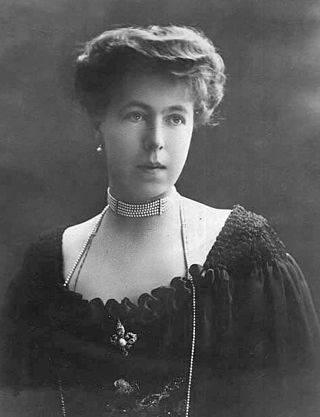
Princess Alexandra of Saxe-Coburg and Gotha was the fourth child and third daughter of Alfred, Duke of Saxe-Coburg and Gotha, and Grand Duchess Maria Alexandrovna of Russia. As the wife of Ernst II, she was Princess consort of Hohenlohe-Langenburg. She was a granddaughter of both Queen Victoria of the United Kingdom and Tsar Alexander II of Russia.
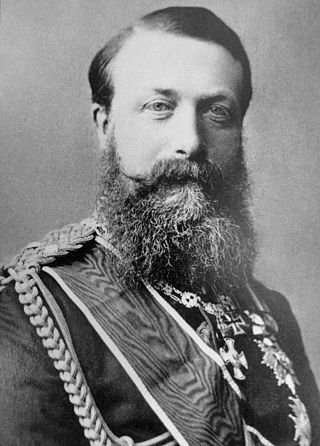
Frederick I was the Grand Duke of Baden from 1858 to 1907.

Princess Feodora of Leiningen was the only daughter of Emich Carl, Prince of Leiningen (1763–1814) and Princess Victoria of Saxe-Coburg-Saalfeld. Feodora and her older brother Carl, Prince of Leiningen, were maternal half-siblings to Queen Victoria of the United Kingdom.

Prince Friedrich of Saxe-Meiningen, Duke of Saxony was a German soldier and member of the Ducal House of Saxe-Meiningen.

Prince Ferdinand Georg August of Saxe-Coburg and Gotha was a German prince of the House of Saxe-Coburg and Gotha and a general of cavalry in the Austrian Imperial and Royal Army during the Napoleonic Wars. Initially remaining a Lutheran until 1818, by marriage he established the Catholic branch of the family, which eventually gained the thrones of Portugal (1837) and Bulgaria (1887).
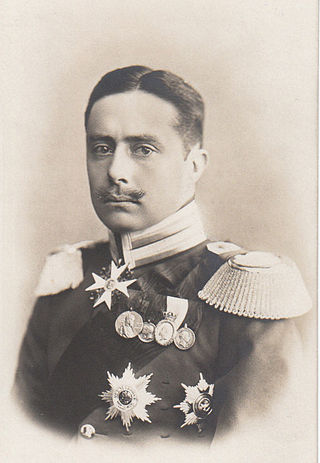
William Ernest was the last grand duke of Saxe-Weimar-Eisenach.

William, Prince of Hohenzollern was the eldest son of Leopold, Prince of Hohenzollern and Infanta Antónia of Portugal.
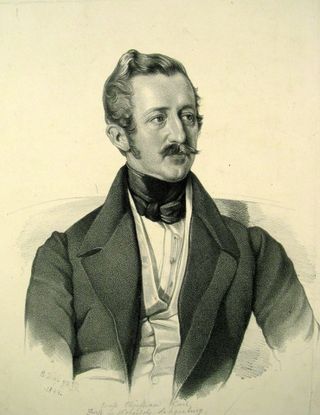
Ernst Christian Carl, 4th Prince of Hohenlohe-Langenburg was the son of Prince Carl Ludwig of Hohenlohe-Langenburg and Countess Amalie Henriette of Solms-Baruth.

Ernst Gunther II, Duke of Schleswig-Holstein, was a son of Frederick VIII, Duke of Schleswig-Holstein and Princess Adelheid of Hohenlohe-Langenburg. He inherited his father's title as titular third duke of Schleswig-Holstein.

Ernst, Prince of Leiningen was a German nobleman who served with distinction in the British Royal Navy.

Hermann, Prince of Hohenlohe-Langenburg was the 6th Prince of Hohenlohe-Langenburg and the second son of Ernst I, Prince of Hohenlohe-Langenburg, and Princess Feodora of Leiningen.
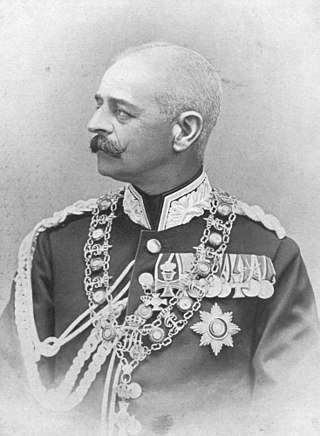
Frederick Augustus II was the last ruling Grand Duke of Oldenburg. He married Princess Elisabeth Anna of Prussia, daughter of Princess Maria Anna of Anhalt-Dessau and Prince Frederick Charles of Prussia. After her death, he married Elisabeth Alexandrine of Mecklenburg-Schwerin.
Carl Ludwig II, 5th Prince of Hohenlohe-Langenburg, was the eldest son of Ernst I, Prince of Hohenlohe-Langenburg. He was the fifth Prince of Hohenlohe-Langenburg.
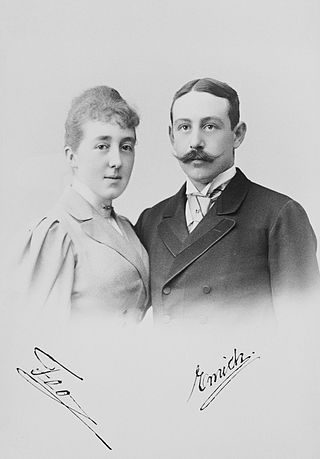
Emich, Prince of Leiningen was the son of Ernst, Prince of Leiningen. He was the fifth Prince of Leiningen from 1904 to 1918, and afterwards titular Prince of Leiningen from 1918 until his death.

Heinrich XIV, Prince Reuss Younger Line was Prince Reuss Younger Line from 1867 to 1913.

Victor I, Duke of Ratibor, Prince of Corvey, Prince of Hohenlohe-Schillingsfürst was a member of House of Hohenlohe-Schillingsfürst and later Duke of the Silesian duchy of Ratibor and Prince of Corvey.

Princess Leopoldine of Baden was a Princess of Baden by birth and Princess of Hohenlohe-Langenburg by marriage.

Hermann George Bernard of Saxe-Weimar-Eisenach was Prince of Saxe-Weimar-Eisenach and Duke of Saxony, and a general in the Württemberger army.
References
- ↑ (in German) Otto Gerlach, Kösener Corpslisten 1960 (Bochum: Verbandes Alten Corpsstudenten [Association of Old Students Corps], 1961), Corps List 129, p. 381; Corps List 9, p. 713
- ↑ (in German) Königliches Statistisches Landesamt [Royal State Office of Statistics], Hof- und Staatshandbuch des Königreichs Württemberg 1907, Erster Teil [Court and State Handbook of the Kingdom of Württemberg 1907, First Part] (Stuttgart: W[ilhelm]. Kohlhammer Verlag, 1907), p. 31
- ↑ (in German) Ernst Klee, Das Kulturlexikon zum Dritten Reich. Wer war was vor und nach 1945 [The Cultural Dictionary of the Third Reich: Who was What Before and After 1945] (Frankfurt am Main: S. Fischer, 2007), p. 261.
- ↑ "Königliche Orden", Hof- und Staats-Handbuch des Königreich Württemberg, Stuttgart: Landesamt, 1907, pp. 32, 78 <